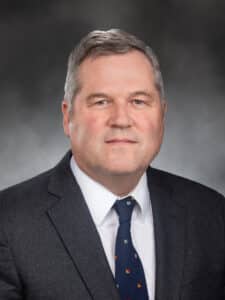Community Government
Inattention to disabilities prompted Caldier to leave Republican Caucus
Documents obtained by Gig Harbor Now through a public records request indicate that state Rep. Michelle Caldier of Gig Harbor left the Washington House Republican Caucus to protest what she views as inadequate accommodations to help her serve while experiencing vision loss.
Caldier remains a Republican, but she left the Caucus in November 2022, not long after she won re-election to her fifth term. Documents indicate she quit the caucus during its reorganization meeting in Spokane on Nov. 17. Gig Harbor Now first reported Caldier’s departure from the caucus in January.
Caldier said then and continues to say that she will eventually return to the House Republican Caucus.
The Gig Harbor Republican initially declined to explain why she left the caucus, citing her desire to return to it and to not engender hard feelings among her fellow Republicans. She agreed to speak with Gig Harbor Now only after seeing documents disclosed by the House under the state’s Public Records Act.
Seeking ‘change in the culture’
Caldier said that both the Caucus and the House itself have offered insufficient accommodations. She also alleged that Caucus leadership, specifically House Republican Caucus Leader J.T. Wilcox of Yelm, have not supported her efforts to improve the accommodations and culture for members who suffer from disabilities.
“My leadership has not fought for me,” Caldier said.
“I want a change in the culture of how we treat other members,” she added. “That’s something I wanted to do very quietly. … I’m not one to air out all the dirty laundry. But at the same time, I just think our state deserves better.”
Wilcox issued a statement via email saying the House, not the Caucus, is responsible for helping Caldier.
“The issues you are asking me to comment on are the responsibilities of the Washington State House of Representatives, including the non-partisan Chief Clerk’s Office and Human Resources Department. These issues are not under the control of the House Republican Caucus. I have taken this matter seriously and spoken to Chief Clerk Bernard Dean about it several times,” said the statement, attributed to Wilcox and sent by House Republican Caucus Communications Director John Handy.
Dean, in an email to Gig Harbor Now, acknowledged that his office is responsible for responding to accommodation requests. He declined to discuss specific accommodations provided to Caldier or any other member.
“When we become aware of an accommodation request, we provide an individualized response through an iterative process to meet the individual’s needs,” Dean said in his email. “The House takes its responsibility for responding to requests seriously and always strives to find solutions.”

Rep. Michelle Caldier, R-Gig Harbor
Caldier’s disability
Caldier suffers from vision loss caused by glaucoma. That is neither a secret nor widely known.
She said she lost vision in her left eye “almost overnight” in December 2016 and was diagnosed with glaucoma shortly thereafter. Since then, she’s had “probably 100 procedures and surgeries.”
Now she wears a prosthesis to shield her eye from light. Extreme light sensitivity is a common symptom of glaucoma.
Caldier is left with limited vision in her right eye. She says she can see about 12 inches in front of her face out of her right eye but is legally blind.
“A part of me feels like, because I’m such a strong person and because I’ve managed to figure out how to do this job without vision, a lot of people look at me and they don’t see that I don’t see,” Caldier said. “I’ve done a very good job of trying to hide that.”
Going public
Caldier did not go public with her vision loss for several reasons. Basic privacy is one. A political calculation was another.
She worried that acknowledging the vision loss could open her to attacks from opponents in both parties, who might argue the disability made her a less-effective legislator.
That has changed this year. In January, she introduced House Bill 1463, which would have required the state to provide transportation for employees or elected officials required to work past the time when public transportation options are available.
Caldier’s email to Gig Harbor Now announcing the bill included a video in which she discusses her vision loss. She also discussed her vision loss in a story earlier this year in the Key Peninsula News.
House Bill 1463 did not advance this year, though Caldier plans to reintroduce it in future sessions. The bill was meant to address one of the issues she had with the leadership of her caucus.
Letter from disability advocate
One of the documents Gig Harbor Now obtained via a public records request is a letter on Caldier’s behalf from David Carlson, an attorney and director of advocacy for Disability Rights Washington, to Wilcox. The letter is dated Dec. 16, 2022.
Though the letter is redacted with the intent of protecting Caldier’s medical privacy, it cites the Americans with Disabilities Act and references difficulties attending “site visits outside Olympia.”
The context of the document makes clear that Caldier requested assistance with transportation to meetings or events outside of Olympia, and was frustrated with the caucus’s response.
According to the letter: “the only suggestion she has been provided is to persuade colleagues (redacted), traveling hours out of her way, over dangerous mountain passes, simply to attend site visits necessary for her work with the caucus.”
In her interview with Gig Harbor Now, Caldier confirmed that transportation poses a major issue for her and she has requested accommodation from the caucus in getting to required offsite meetings.

A letter from a disability rights advocate to House Republican Caucus Leader J.T. Wilcox, obtained by Gig Harbor Now via public records request.
Another common issue: Getting home or to a place to sleep after all-nighter sessions of the House, which are common, especially near the end of a session.
“We’re expected to be on the floor until 2:30 in the morning, 5 o’clock in the morning, 11 o’clock at night. There’s no Uber available at that time,” she said. “I can’t get to a hotel room.”
She said she makes do by asking fellow legislators to give her a ride. Representatives from both parties have routinely helped her.
But “anyone, regardless of what their disability is, should be able to serve. Other than the physical limitations of me not being able to drive, I can do this job,” she said.
Electronic documents and messages
Accessing and viewing caucus communications also has been an issue, the Disability Rights Washington letter indicated. She has a standing request that documents be emailed to her so she can read them on her phone. Reading printed documents, or documents on a screen far away, can be difficult or impossible.
The letter to Wilcox says: “This standing (request) has routinely ignored or forgotten, leaving her without access to the vital information being shared with other caucus members. Similarly, the Microsoft Teams’ chat feature, which is reportedly used on the House floor for fast-paced communication, is not accessible for her and its continued use” has left Caldier “out of critical, real-time discussions and decision making.”
“This would never fly in a business,” Caldier told Gig Harbor Now. “I was hoping to fix things internally. I did not want the press to get involved. … But I’m also not going to be a doormat.”
Help from colleagues
For now, Caldier has worked out ways to get around in Olympia. She can get to work, helped in part by her recent move to Gig Harbor from Port Orchard. She lives not far from her seatmate, freshman Republican Rep. Spencer Hutchins.
Caldier can see just enough, and has memorized her routes well enough, to get around the capitol campus on foot.

Rep. JT Wilcox, R-Yelm
And, she emphasized repeatedly, she gets plenty of help from colleagues on both sides of the partisan divide.
“I could not do my job without my colleagues. That includes both Republicans and Democrats,” Caldier said.
She expressed frustration over what she believes are disparities in the accommodations extended to her versus those offered to Cyrus Habib, a former Democratic state senator and lieutenant governor who is also legally blind.
“They provided him with a lot more than I ever received. They treated him very differently than I was treated,” Caldier said. She believes that may be partially because her vision loss may be less apparent to casual observers than Habib’s, and because women are just treated differently.
“When you ask for help as a woman in the workplace, people treat that differently,” she said.
Working without caucus support
Operating as a legislator without the support of a caucus has been challenging.
Since she’s not a member of the House Republican Caucus, she does not have the support of its staff. Instead, she makes greater use of staff from the Legislature’s Office of Program Research, which provides nonpartisan policy, legal and fiscal services.
The caucuses operate and provide members’ official legislative websites. So Caldier doesn’t have one at the moment.
She still has the support of a legislative assistant. But some functions that staff typically would handle, like writing a constituent email, now fall on Caldier’s plate.
“I think they thought I wouldn’t be able to survive,” Caldier said. “But no, I’m able to write my own emails just fine.”
Additionally, she is not a member of any legislative committees. Committee membership is assigned by caucus leadership. Since she’s not a member of a caucus (or, as she jokes, she’s the sole member of the Caldier Caucus), she’s not on committees.
Another document obtained via a public records request indicates Caldier was set to be on the Appropriations; Human Services, Youth and Early Learning; and Regulated Substances and Gaming committees.
Who’s at fault?
Caldier disagreed with Wilcox’s characterization that the issue is entirely a matter for House, not Caucus, staff. She said she was directed from when she was first elected to take such matters up with leadership of her caucus.
Further, some of the problems she has encountered occurred at Caucus-organized political events, like the November 2022 meeting in Spokane where she made up her mind to leave the Caucus.
She linked the lack of support she has received from Caucus leadership to its shrinking membership. The 98-member House included 48 Republicans when she took office in 2015.
“Now, without me, the House Republican Caucus is at 39. Our leadership is OK with me sitting outside. That says a lot about (Wilcox) as a leader,” Caldier said.
But rejoining the Republican caucus remains her goal.
“Oh, it will happen,” she said. “I want our state to come back to being balanced, and we need a functional Republican Party for that. And a functional Republican Caucus.”
